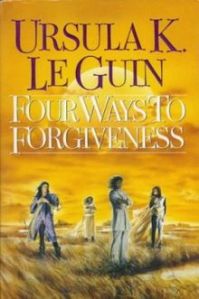
I think this is the book that has the introduction I discuss in this post. I can’t remember.
About a million years ago my alter ego wrote book two in what will hopefully soon become a four-book series. After several years of no sales with my former agent, and then a few years of looking for a small press for the series, I ended up self-publishing books one and two, then getting to work on book three. Now I’m working on book four, which will probably be ready to go later this spring. That’s when I discovered I’d written myself into a corner.
Each volume in this series is semi-standalone: they’re all in the same setting and timeframe, but there’s a different main character and a separate plot for each one, with a little bit of overlap from book to book. Some of the minor characters make appearances in more than one book, and events from one story are mentioned in another. By the time I wrote book two, I had a general idea of who the main characters in books three and four would be, and I wrote two scenes where those characters got introduced, one in person, and one in conversation.
I remembered the first scene when I wrote book three. A version of the scene from the other character’s point of view appears in book three. The other scene – the conversation that introduced my MC for book four… I completely forgot about it.
Oops. I had a few thoughts in mind when I sat down to write book four, but I’d forgotten the specifics. Almost 50,000 words in, I remembered. And I realized that the timeline I’d written for book four was completely inconsistent with book two. There was no way my book four characters could be in the right time and place to meet the book two characters who talk about them.
So now I had a dilemma. Do I keep what I’ve written so far, and go back and edit book two to remove that conversation? It wasn’t a crucial scene, and book two will be fine without it. Or, do I toss 50,000 words and revise book four to fit the book two timeline?
I had to think about it for a while, and I ended up making a list of pros and cons. (My high school social science teachers would be proud.) Shoehorning book four into the book two timeline would solve the inconsistency, as well as one other problem concerning character development, but it would introduce a new character development problem, which was even bigger. Sticking with the 50,000 words I had wouldn’t introduce that new problem, and I can go back and fix the existing character issue in editing. Also, self-publishing does make revisions easy, and very few copies of book two have sold, so not many readers will be affected by the change.
Of course, I could use the discrepancy as a promotional tool. Create a “who can find the mistake?” giveaway, maybe. Could be fun.
All of this reminds me of an introduction Ursula K. LeGuin wrote for one of her collections of short stories, which she wrote in her Hainish universe a few decades after writing her groundbreaking novels in the same setting. She acknowledged that there were some small inconsistencies between the older novels and the newer stories. “I told you,” she said, “I forget things.”
If one of the greats in the genre can admit to making mistakes, I suppose the rest of us can. Now, let’s see if anyone can find my Easter egg…

What’s less work? It sounds like editing book 2 will be the thing that fixes it. It also sounds like you’ve changed your mind on what would happen from when you first wrote it, so go with the new revised version of the 50k, and change book 2 to reflect the reality and boom, it’s fixed. Amazon permits you to upload changes to the books and then readers can download the revised version via a tab on the list of books. Unfortunately, most won’t necessarily go back to get the revised version or re-read it, but at least it’s out there and it’s fixed. I see this where I’ve sent authors corrections on typos and punctuation problems and then boom, there’s a new version out. I’m not going to reread it– I just read it!– but I know any new readers will get a better product and the author looks smarter and the reader doesn’t get jarred out of the book by stuff that should have been edited and fixed and wasn’t.
So, yar, go back and fix book 2, and you won’t be shoehorning a larger work.
Something to consider. Thanks!